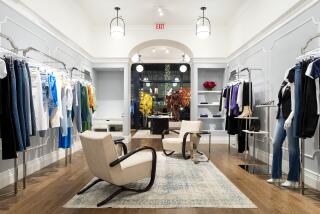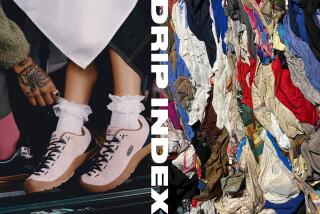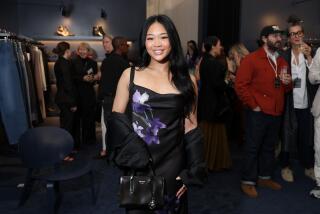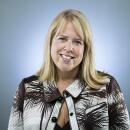Rebecca Minkoff store on Melrose is designed for ‘how a millennial would want to shop’
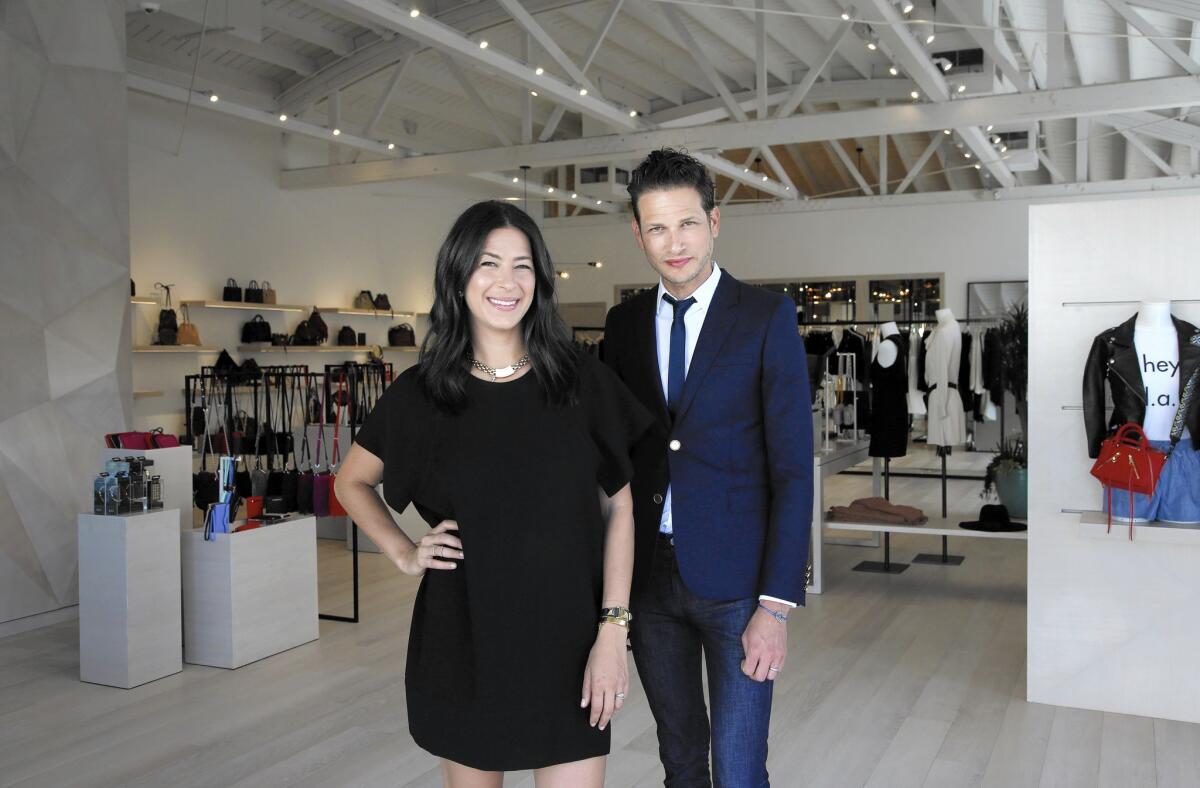
You know that awkward social moment when you walk into a store and maybe you know exactly what you want, maybe you’re just browsing, maybe you want a salesperson to speak to you, or maybe you just want to be left alone?
The solution is at your command at the new Rebecca Minkoff flagship on Melrose Avenue, a store for the future wired for the next-gen shopper.
Walk in and you’re not greeted by a live salesperson, but by a life-size, touchable, mirrored video wall. Instead of saying, “Hi, what’s your name, can I help you?” the screen asks if you’d like something to drink. Click on water, sparkling water, green tea, coffee, espresso or bubbly (champagne, please!), input your mobile number, and you’ll get a text when your beverage is on the way (served by a live, cutely attired salesperson, not a cutely attired robot — just yet).
You can walk into the airy, blond wood store, filled with Minkoff’s fringed and studded, Patti Smith-inspired fall ready-to-wear, shoes and handbags, or you can continue browsing looks onscreen, including the designer’s favorites. Choose the Harpur leather biker jacket ($598), floaty North peasant top ($198) and a pair of studded Mollie combat boots ($350) in your size, add them to your dressing room — click, click, click — and you’ll get a text when they’re waiting for you, all without having to speak to anyone.
Sounds like heaven, no?
“We wanted to look at how a millennial would want to shop,” says Uri Minkoff, 40, the designer’s brother and the company’s chief executive, during a tour of the store. “She’s grown up with e-commerce, she’s grown up with mobile, she’s a digital native.”
The dressing room experience is also digitally driven. Although there are no cameras inside, there are digital mirrors that sense what styles have been brought into the room by reading RFID (radio-frequency identification) tags on each piece.
Want a different size in that leather jacket? No need to peer, half-naked, out the door looking for god knows who just introduced herself. Just key in what you need and it will appear. The screen in the dressing room mirror even tells you how much time it will take to arrive, a la Uber, (one minute, two minutes or more).
Wondering what to wear with that jacket? The screen offers Rebecca’s styling ideas, as well as product details and alternate views. It’s almost like shopping with the designer herself. You can even adjust the lighting in the room by occasion. Choose “Runyon Canyon morning,” “afternoon on Melrose,” “Santa Monica sunset,” or “WeHo after dark.”
“If you don’t want the tech, you can minimize it,” explains Rebecca, 34. “What’s nice is you decide your own experience, how much interaction you want or not. It puts you in control.”
Of course, all of this interaction also gives the brand a lot of information about you, the shopper, some of which can be used to create a better service experience and some of which veers into Big Brother territory. “If you look on the salesperson’s iPad, she has a record of everything you are doing. She knows your sizes, your styling preferences,” says Uri. “She can start bringing you things that might be outfit completers based on what’s in your fitting room.”
Good luck getting out of the store without buying something after all that. The system is rigged!
If you’re logged into PayPal on your phone, you don’t even have to get your wallet out. The salesperson bags your items, and you’re off with more free time to Snapchat. And if you have the willpower to just browse and not buy, you can save a record of what you tried on, share it with friends and family, and get a wish list going at RebeccaMinkoff.com.
In 2014, the Minkoffs opened the first two flagships using their new EBay-powered shopping technology in New York City and San Francisco. And so far, the tech tools have led to an increase in sales, they say. “We’re known for our handbags, but we’re seeing 30% of women using the fitting rooms are asking for additional ready-to-wear items to be brought in based on the advice they are getting from Rebecca,” Uri says.
The Minkoffs also get daily “dressing room abandonment analytics” reports. And while they can’t see that you winced trying to squeeze into skinny jeans (again, no cameras in the dressing rooms), they can see what you brought in and what you didn’t bring out, and that information has affected the design process.
“When we opened our stores, we were surprised to see that the pieces from our denim and casual category that we originally designed in small quantities exclusively for our e-commerce site and [wholesale accounts] were out-performing our expectations,” says Rebecca. “Knowing that these pieces were doing so well, we designed deeper into this category.”
The Melrose flagship is the biggest yet for the designer, who grew up in San Diego and launched her collection in 2001. In 2004, her first runway show was taped as a plotline for the TV shows “Laguna Beach” and “The Hills,” but it wasn’t until 2005, when she debuted her Morning After Bag, that things really took off. A satchel designed to be small enough for a night on the town but large enough to carry a change of clothes, the style attracted a celebrity following that included Jessica Alba and Reese Witherspoon, and it continues to be a bestseller today in mini and crossbody styles. That same year, Uri, a former software executive, stepped in to help run the business.
Today, the brand is in the nine figures in sales volume and at a rate of growth at an average of over 20% annually, according to Uri. Handbags are still 75% of the overall business. Prices top out at $895 for all categories, which makes Rebecca Minkoff an entry point into the luxury market, competing with the likes of Kate Spade and Coach.
The L.A. store is the launchpad for the new Minkoff athleisure collection, which includes leggings, hoodies, flutter top sports bras and yoga bags, as well as a new Uri Minkoff men’s corner featuring laptop cases, backpacks, weekenders and “dreakers” (dress-sneakers). There’s also an art space to use for events such as the yoga-in-the-dark classes held opening weekend.
The siblings have big plans for growth. Stores are already open in Korea, Japan and Hong Kong, and new spaces are planned for Chicago and Dubai in the coming months.
But for now, they’re happy to have a home base in SoCal. “Our first account was here, at Satine,” the designer remembers.
“And Rebecca’s design sensibility is back and forth between boho and rock, and L.A. is where that movement is generating from,” Uri adds. “We felt it was right and timely to open a big beautiful space here.”
Rebecca Minkoff
Where: 8335 Melrose Ave., Los Angeles
When: 11 a.m. to 7 p.m. Monday through Saturday; noon to 6 p.m. Sunday
Information: www.rebeccaminkoff.com
